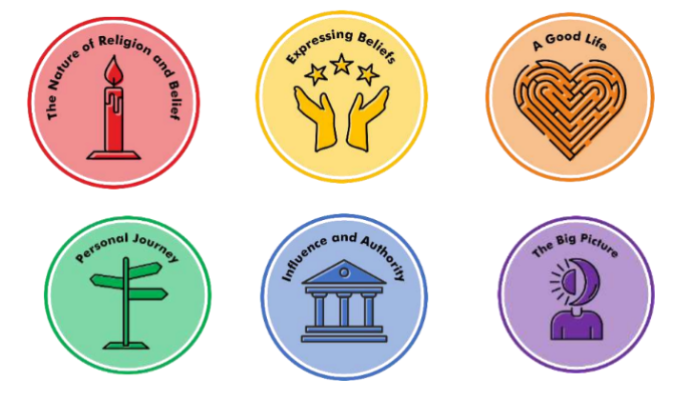RE skill progression year 1-6{SECTION_MENU}
Religious Education
Our leading expert, who ensures Religious Education is planned across the school-age groups, is Miss Davis.
Overview
RE should explore the important role that religious and non-religious world views play in all human life. This is an essential area of study if pupils are to be well prepared for life in a world where controversy over such matters is pervasive and where many people lack the knowledge to make their own informed decisions. It is 'a subject for all pupils, whatever their own family background and personal beliefs and practices.’ Commission on RE, September 2018.
Course Outline
Religious Education helps young people to understand and articulate their own views about religion and world views. It helps them comprehend that not everyone feels the same as them but teaches them to see other people`s points of view.
Intent
At Carlton Primary School, Religious Education (RE) is an essential part of our curriculum, promoting open, respectful, and balanced exploration of diverse beliefs.
Our curriculum:
- Encourages moral growth by fostering a safe space for pupils to share and respect each other's feelings, beliefs, and values.
- Engages with a variety of traditions, including Abrahamic religions (Christianity, Islam, Judaism), Humanism, and Dharmic beliefs (Sikhism), providing a broad perspective on faith and belief systems.
- Explores fundamental concepts such as worship, festivals, morals, traditions, and beliefs, allowing students to build an understanding of cultural practices and values.
- Cultivates a theological perspective where students learn to study, compare, and analyse religious traditions non-judgmentally, developing skills to understand creation stories, environmental impacts, and the significance of community and shared beliefs.
This equips children with essential knowledge and insights into the beliefs and practices of various religions and worldviews that have influenced history, culture, and personal growth. Today’s world requires young people who are secure in their own beliefs and values, allowing them to respect the religious and cultural diversity of others and actively contribute to an empathetic society.
In summary, we believe that RE should dismantle stereotypes and nurture every child’s potential, supporting individual growth within an inclusive and supportive environment. Through RE, our pupils gain the knowledge and values needed to appreciate cultural diversity, embrace equality, and respect diverse worldviews.
Implementation
Our curriculum follows the Leeds Agreed Syllabus for Religious Education (Believing and Belonging by Pennine Learning). Lesson content is adapted to meet the needs of individual classes or to make links with other subject areas. Where possible, cross curricular links with core subjects are made. We promote the equal value of all religions as well as teaching the children to celebrate cultural diversity.
The Head teacher and Governing Body are responsible for ensuring that Religious Education (RE) is a fundamental part of the school’s curriculum. However, parents retain the right to withdraw their child from RE and should contact the Head teacher if they wish to exercise this option.
At Carlton Primary School, RE is structured around six conceptual pathways –The Nature of Religion and Belief, Expressing Belief, A Good Life, Personal Journey, Influence and Authority, and The Big Picture.
Foundation Stage
At Carlton Primary School, pupils will encounter religions and other world views through special people, books, times, places and objects and by visiting places of worship. They will listen to and talk about stories from a range of different religions and world views. Pupils will be introduced to subject-specific words and use all their senses to encounter beliefs and practices. They will be encouraged to ask questions and talk about their own feelings and experiences.
Key Stage 1
Pupils will develop their knowledge and understanding of religions and world views, recognising local, national and global contexts. They will use basic subject-specific vocabulary. They will start to raise questions about beliefs and find out about questions of right and wrong and begin to respond with their own views.
Key Stage 2
Pupils will extend their knowledge and understanding of religions, beliefs and values, recognising personal, local, national and global contexts. They will be introduced to an extended range of sources and subject-specific vocabulary. They will be encouraged to be curious and to ask and discuss increasingly challenging questions about beliefs, values and human life, drawing on the insights of religions and other world views. Pupils will respond with their own ideas, identifying relevant information, selecting examples and giving reasons to support their ideas and views.

Impact
At Carlton Primary School, pupils will:
- Make progress and meet national standards, regardless of their background or starting points.
- Engage in self-reflection, asking questions of themselves and others.
- Review their own experiences and learn how to relate them to the wider world.
- Develop an openness to learn from others, fostering empathy and understanding.
- Appreciate the diverse heritage of faiths and beliefs, building critical thinking and reflective skills.
- Grow spiritually, academically, emotionally, and morally, gaining deeper self-awareness and understanding of others.
- Be prepared for the opportunities, challenges, and responsibilities of living in a dynamic, multicultural society.
- Participate in lessons that encourage choice, independence, and open-minded thinking.
- Show respect for different beliefs, maintaining a positive attitude towards diversity.
- Recognise and respect the varied ways people seek meaning and self-understanding, valuing these differences for the benefit of all.




